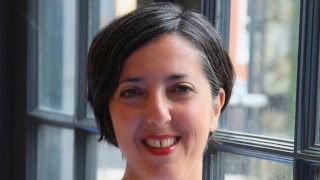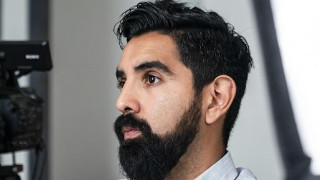Museum Professions Program Welcomes Industry Thought Leaders to the Virtual Classroom
Thursday, May 6, 2021

Elif Gokcigdem
This semester, museum professionals from across the country were able to join M.A. in Museum Professions (MAMP) students virtually and share their personal and professional philosophies of practice in accordance with MAMP course goals. These speakers — Elif Gokcigdem, a thought leader, historian of Islamic art, and museum scholar, and Armando Perla, Head of Human Rights at the Montreal Holocaust Museum — visited two Museum Professions graduate classes to provide practical knowledge and insight on issues critical to the museum field, such as empathy, diversity, inclusion and human rights.
Inviting guest speakers to join classes helps further the College's goals of providing students with immersive experiences and opportunities to apply, test, reflect on, and refine their growing knowledge and skills inside and outside the classroom and into professional practice.
"A hallmark of the Museum Professions program is its career-focused experiential, social and constructivist pedagogy that relies on research, writing, presentation and reflective practice," said Program Director Gregory Stevens. "In addition, grounding in the professional and scholarly literature, students benefit from having discourse about current issues impacting the field. Interaction with museum practitioners, team-based guidance and career guidance during and after degree completion are other goals of the program." With this pedagogy, students can develop professional skills and values that will help them succeed in their museum careers.

Armando Perla
On February 25, the Museums, Activism and Social Issues class welcomed Armando Perla, Head of Human Rights, Montreal Holocaust Museum and International Advisor on Museums, Human Rights and Social Inclusion for the City of Medellin in Colombia, to speak on critical issues facing the museum sector, our collective need to ground museum practice in human rights and social justice frameworks, and our institutional and individual responsibility to take action. After completing the Museums, Activism, and Social Issues course, graduate students are able to identify complex problems in museums related to museum activism and response to social issues, in order to contribute to more equitable and just societies. Through Perla's talk, students heard real world examples of museums and programs that participated in social justice work, encouraging the development of those skills.
On March 4, the Museums and Communities class welcomed Elif Gokcigdem, Ph.D., the founder of ONE (Organization of Networks for Empathy) and Empathy-Building Through Museums Initiative. Gokcigdem, who is committed to creating fertile grounds of empathy through informal learning platforms, is also the author and editor of Fostering Empathy Through Museums (2016) and Designing for Empathy (2019), which were required course material for the Museums and Communities class. Through an engaging discussion, students discussed the readings and sought to answer the following essential question: Why and how should museums foster empathy? Through this discussion, students were able to meld practical applications of museum work with museum and psychological theory, clarifying the needs of the field and the needs of visitors.
These class experiences and guest presentations have been instrumental in helping students gain field experience while many museums in the field are currently closed due to the Coronavirus pandemic. "The Museum Professions program helps graduates contribute key expertise to the institutions in/for which they may work, foster robust communities of practice, communicate effectively about the evolving museum paradigm, and advocate for why museums are essential in a pluralistic society," said Stevens.
The College currently offers Communication, including the opportunity to pursue a unique area of study, including options in Public Relations, Digital Communication/Communication Technologies, and Communication in Organizations. In addition, four dual-degree options, including three accelerated master's/B.A. programs and a dual M.A. degree with the School of Diplomacy and International Relations are offered.
For more information about Dr. Ryan Hudes.
Categories: Arts and Culture, Education






